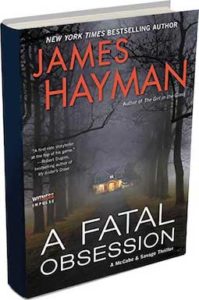Reading is Dead. Or is It?
I write novels for a living. Suspense thrillers like The Cutting and The Chill of Night. Conventional wisdom and constant commentary tells me I ought to be worried.
They say that books and bookstores are dead or dying, young people don’t read any more and the written word is going the way of the dodo bird. All done in, it is said, by competition for attention (or as we used to say in the ad biz, competition for share of eyeballs) from endless and mindless TV stations, endless and even more mindless video games and, of course, the Internet.
I recently came across (on the Internet, of course) a poem, a kind of take off on Dr. Seuss, written by fellow thriller writer Jeffrey Deaver called The Death of Reading (http://www.jefferydeaver.com/Other_Projects/Death/death.html) in which he states the proposition nicely:
Reading is dead, deceased, pushing up daisies.
People are growing increasingly lazy,
lured by the siren of electronic toys
That fill up their lives with meaningless noise.
PlayStations, Facebook, big-screen TVs
And mobile phones smarter than I’ll ever be.
We pray at the altar of our brand-new God,
Who’s powerful and wise and whose name is iPod.
But, by the end of the poem, Deaver puts the lie to the whole thing.
A few years ago when I was downtown,
Doing some shopping, just strolling around
I nearly died in a massive stampede
Of children, no less, in desperate need
To purchase their latest heart’s desire,
No batteries required, no software, no wires,
A book’s what they sought and they’d waiting all day.
Who’s this Harry Potter guy, anyway?
We love reading so much that the books we now see
Are changing from what they used to be.
Originally written in clay and on leaves,
Books are now “printed” on digital screens.
I don’t think reading is dead, either. Yes, like Deaver, I’m a writer. And yes, like Deaver, I have a vested interest in people buying and reading my books. But even if I didn’t, I still think I would believe, as Mark Twain once said of his own death, that the reports of the death of the written word are greatly exaggerated.
In fact, I would argue just the opposite, that reading, writing and the written word are healthier and stronger than ever. It’s just that the delivery system has changed, going from paper and ink to a digital screen.
When I was a kid, there were only two ways to read. You either picked up a book or you read a newspaper or magazine. That was it.
Today more people than ever are reading and writing. They’re mostly just doing it on a screen. Kindles. Nooks. iPads. And, of course, regular old computers. Life Magazine is gone. But Slate and The Daily Beast seem to be thriving. Written emails have replaced letters and even, to some extent, the telephone. I don’t know how many blogs or bloggers there are but it’s got to be way up in the millions or even tens or hundreds of millions. And people aren’t just writing blogs, people are reading them. A few like Julie Powell are even becoming famous and turning their blogs into traditional books and then turning them into movies starring Meryl Streep and Stanley Tucci.
But I think even traditional paper and ink books will manage to survive and prosper.
While commercial publishers have seen their sales decline, self-publishing is booming. It’s allowing many new authors who never would have found a publisher before to enter the field and find success. Just recently a friend and neighbor of mine named Fran Houston self-published a lovely and evocative oral and photographic history of the people who live on a small island off the coast of Maine. The book is called For Love of Peaks. And people are buying it. Both in local bookstores and on the Internet. Twenty years ago that never would have been possible.
There are fewer independent bookstores. According to an article in the Boston Globe (http://www.boston.com/news/local/massachusetts/articles/2009/04/02/unchained_success/) their numbers declined from around 6,000 in the early 1990’s to roughly 2,200 today. But according to that same article, in spite of the worldwide recession, those that survived seem to be stronger than ever. Online book sales have exploded. Amazon is a retail phenomenon. The chain bookstores, Borders, Barnes & Noble and others seem constantly crowded.
I still like the feel of a real book in my hand. But, if the truth be told, I really don’t care whether the people who buy my Mike McCabe thrillers, The Cutting and The Chill of Night, read them in hardcover, paperback or electronically. I just hope they enjoy the story.

